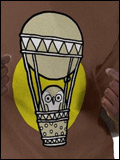I did an interview today in which I think the questions were more interesting and thought out than usual… As always, I'm archiving my responses here… Oh, and check out the site Grinding.be that the interviewer mentions — I think many people will find it quite interesting.
1. So the paper I'm writing is on the philosophical and spiritual reasons behind body modification, specifically tattooing and “extreme” mods such as amputation, self-”mutilation”, and the like. Do you have any thoughts on this in general? Do you feel like more people have these types of reasons for modding than the “because I can” reason a lot of people associate with body mods?
Body modification is about seizing control of how we interface with the world — by manipulating the form of our bodies we communicate who we are, change the way others interact with us, and even change the way that the world feels to us. Body modification allows a person to fine-tune their biological experience to a surprising degree, both on a sociocultural level, and on a purely physical experiential level. Even if a person does it “because they can”, they are still doing these things.
2. I read in either one of your interviews with a DIY Amputee, or in the comments on ModBlog on one of those interviews, that one reason for amputation is that the “body is just another medium for art, like a canvas or clay.” Why do you think that this extreme form of body modification is viewed as a mental disorder by many people, and also – where do you see the idea of the body as a medium for art evolving in the future?
I think it's very normal for people to see foreign extreme behavior that they don't understand as mental disorders. Most people are very xenophobic and unable to understand that there is a broad set of acceptable ways to live. I don't see making changes to the body — a tangible experience that brings people joy and meaning — as any more of a mental disorder than, say, believing that an invisible superbeing will reward you after death for having following arbitrary and conflicting rules while you live… something that all too many people are convinced is the truth.
As to where the medium of body modification will evolve to in the future, I'm sure it will change in subtle ways as all art does both in terms of how it's expressed and what the various modes of modification are, and that it will reflect the cultures and subcultures of the time, but really, I do not believe that body modification's role has changed much in the last 30,000 years — it's a low-level way for people to communicate with and express themselves both to others and to themselves. The most profound change that's happened in the last four hundred years is that body modification has become a primarily individualistic activity, rather than a group or familial activity.
3. Part of my paper discusses the development of future technology in body modification – specifically implanting RFID chips, magnets (which you have personal experience with), and the development of more advanced prosthetic limbs (not just for accident victims, but also for enhancing the body when it's not “necessary”). Site's like https://www.grinding.be are already exploring these ideas. What are your views on this exploration and do you have any ideas on these developments yourself?
On the whole I'm a Luddite and a humanist, not a transhumanist, which is why my personal interest is in the magnetic implant — a low-tech wetware upgrade that augments the human experience — versus the RFID implant — an implanted gadget that interfaces us into the machine world. I believe we are already dangerously close to deposing ourselves with machines that are our superiors, and technological augmentation of the human body gives us the false and dangerous misconception that there can be a peaceful merging of biological intelligence and machine intelligence. I believe that this path will lead to the death of the human experience, and I do not support modern AI research or machine-human integration in any way. I think of all the mistakes of the technoindustrial age, this is our largest mistake.
4. I've heard the opinion that people, specifically americans, “copying” tradition tattoos from other cultures (such as Maori facial tattoos, or traditional Japanese Irezumi) is “wrong” and insulting to that culture. What do you think about this?
First, I think it's unfair to categorize this sort of cultural appropriation as an “American” phenomena, because it happens all over the world. In addition, it happens in reverse, with traditional cultures now mimicking our Western tattoos. Also, while there are many artists working in the styles reminiscent of those in other cultures, on the whole they are presented with a uniquely Western flavor and represent a fusion of cultures. Second, cultures intermixing and borrowing from each other is a large part of how art evolves and moves forward, be it tattoo styles or be it religion or philosophy. I think that the only time an affront comes is when one actively seeks to claim and “misuse” the meaning behind the ritual or art — and this can include a misuse of the symbols. Simply being inspired by the style is quite reasonable. That said, I think even “affront” may be stronger than I'd like to put it… At worst it's promoting ones own ignorance to appropriate in this way.
5. You have extensive mods yourself. Would you mind sharing some of the reasons for your mods?
On the whole — probably only the magnetic implant is an exception — I have the modifications I have because I find them attractive and like the way they feel, and to express to the world by means of my physical form who I am.
6. Additionally, one of your distinguishing marks are your stretched lobes, which you don't wear jewelry in. This may just be something I noticed, but historically elongated earlobes with no jewelry in them is a common trait seen in statues of Buddha and Bodhisattva's. Have you ever thought of this/did it have any influence on you in your “look?”
Well, I took my lobe jewelry out because I was snowmobiling a lot and they were getting too cold, and just never got around to putting the jewelry back in. That said, I see “dangling lobes” as a sign of maturity — I like the idea that stretched lobes go through a series of phases: stretching, living with jewelry, and then living without jewelry. If the individual has lived long enough in the first two phases, they can enjoy the third phase. If they have not, their lobes will still have a youthful elasticity and will shrink closed again.
7. What do you think influences some people to do CBT and other posts in the BME-Hard category such as the “Maggot Lover” Interview (besides what “psychologists” would call “masochism” or “sadism” – because that's basically bullshit)?
The explanation is quite simple — they do these things because they enjoy them and it gets them off.



Post a Comment